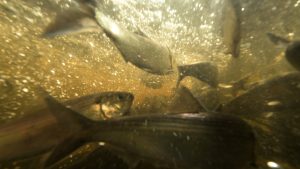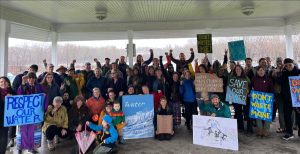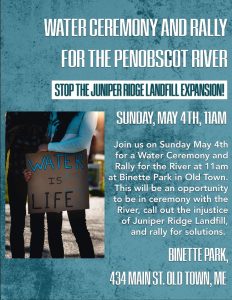(Old Town ME) – Residents living adjacent to Juniper Ridge Landfill, Penobscot Nation Citizens, and environmental advocates are calling last night’s fire at Juniper Ridge landfill an environmental justice disaster.
The landfill has devastating impacts to the environment and public health. It sits between two tributaries of the Penobscot River, which has been the tribe’s means of survival for over 10,000 years. Last night, Chief Francis issued a warning for residents of the nearby reservation to shelter in place with doors and windows closed against the pollution from the fire.
Dioxins are produced and introduced into the environment when waste is burned, and can settle on vegetation and bio-accumulate within the food chain. Exposure to dioxins has been linked to suppression of the immune system, disruption of hormonal systems, liver damage, skin rashes, reproductive and developmental disorders, as well as certain kinds of cancer.
John Banks, retired director of Environmental Resources for Penobscot Indian Nation explained, “Last night’s fire at Juniper Ridge was just the latest incident adding to the existing injury, and will have a disproportionate impact on our community.”
The fire at Juniper Ridge Landfill is just the latest incident that raises real questions about Casella’s management and operations at the State-owned landfill. In February, Casella indicated there was a crisis with their inability to stabilize the waste-water-treatment plant (WWTP) sludge buried there. Casella contracts with some of Maine’s WWTP’s to dispose of sludge and plant operators were left scrambling to find acceptable ways to handle the sludge Casella was refusing to landfill.
The incident threatened a public health and environmental emergency. There have been numerous assertions the situation could have been averted if Casella employed industry-standard methods to deal with the sludge at the landfill. Instead, Casella has insisted they require imported Oversized Bulky Waste (OBW) for that purpose. Watchdogs of the landfill operations have warned that OBW can create spaces in the landfill allowing for gas to build up and for oxidation to occur increasing risk for fire and explosion.
Neighbors have been enduring increased air pollution and noxious odors from the landfill and have sought redress from Casella and state officials to no avail. Casella has been permitted by the State to build an Renewable Natural Gas facility at the landfill and construction has been ongoing.
Citizens and some legislators are asking for an independent evaluation of Casella’s operations at JRL. Ed Spencer, Chair of Don’t Waste ME explained, ” “.
Residents adjacent to the landfill and others from across the state are calling to stop a give-away to Casella who is asking the Legislature to roll back limits on out-of-state waste at Juniper Ridge Landfill that were put in place last session with LD 1639. The Environment and Natural Resources Committee has a work session for this bill LD 718 tomorrow, which was introduced to allow for the increased imports of OBW for two more years.
Neighbors want the Department of Environmental Protection to set up monitoring for air emissions, measure soil depositions, and monitor water pollution. They want testing to include measurements of dioxins and PFAS. They also want a system for monitoring resident’s health complaints and impacts.
Maine residents have been asking Legislators and DEP to step up and assure that the landfill is operated to conserve disposal capacity for Maine waste. The landfill has been filling rapidly with imported waste under Casella’s management. “Residents have the right to expect that the State as owner, and DEP as regulator, will protect the environment and public health of Juniper Ridge Landfill’s neighbors and not be unduly influenced by a multi-billion for-profit waste company like Casella,” offered Jackie Elliott, a long-time environmental health and justice advocate working with Don’t Waste ME






